New Book Offers Unique Reflective Meditation
Written by: Nelly Kaufer & Linda Modaro
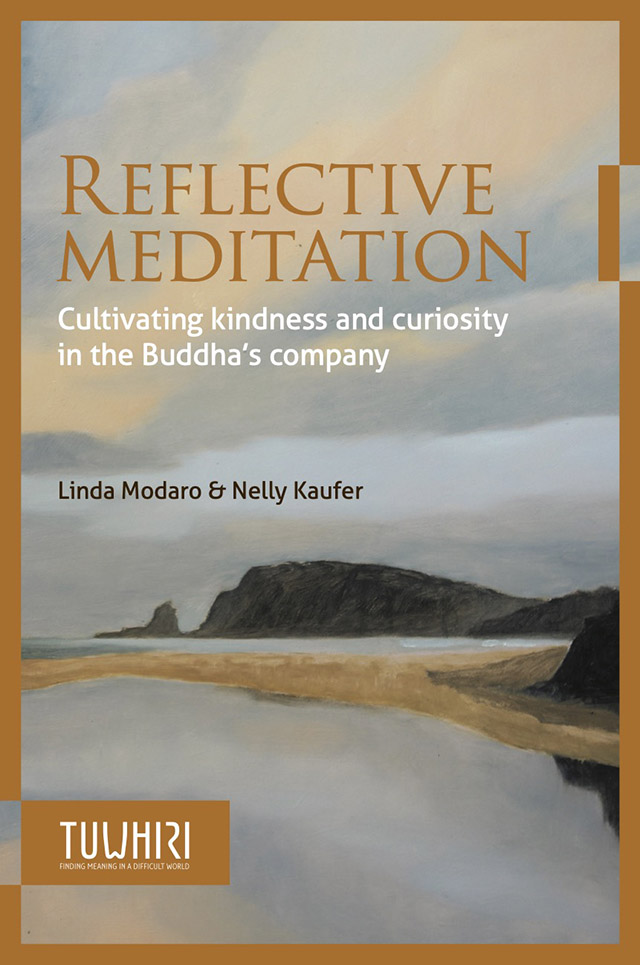
Nelly Kaufer and Linda Modaro offer a communication-based approach to dharma practice in their new book “Reflective Meditation.”
Photos by: Heather Hnizdil, MJ Mazzola, Tuwhiri
A coming book titled “Reflective Meditation: Cultivating Kindness and Curiosity in the Buddha’s Company,” offers new ways of practice that focus on communication and reflection
The book was co-written by Nelly Kaufer, lead teacher of Pine Street Sangha in Portland; and Linda Modaro, California-based lead teacher for online Sati Sangha. The two wrote the book at the request of Tuwhiri, a secular Buddhist publishing house in New Zealand.
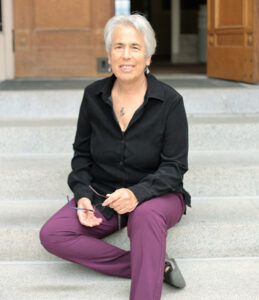
Nelly Kaufer, lead teacher of Pine Street Sangha.
“Reflective Meditation” is a thoughtful and creative take on meditation, mindfulness, and being still, which is grounded in the teaching of conditionality. Starting gently, being curious and staying near experience during meditation, meditators discover ways of being skillful within meditation practice and with life experiences. Greater awareness, wisdom and kindness is developed through recollection and reflection, whether done in a journal or expressed verbally to an experienced teacher or peers.
The book will be available in paper and digitally in the third quarter of 2022 through the publisher, through Amazon, and hopefully through other outlets. It will also be available at reduced cost through fund sourcing, which will help pay the costs of publication.
“Reflective Meditation: Cultivating Kindness and Curiosity in the Buddha’s Company,” welcomes you into a lively, open-minded, often humorous, and insightful conversation between the founders of Reflective Meditation. You may find yourself laughing out loud, or possibly feeling a great sense of relief, as Modaro and Kaufer lightheartedly articulate a broad, roomy, and inclusive path for turning inward, reflecting, and using the language of experience to cultivate a deeply rewarding and satisfying meditation practice.
Amidst the banter, you will receive clear instructions and guidance on how to develop your own Reflective Meditation practice, as well as a sensitive and intelligent overview of basic early Buddhist teachings.
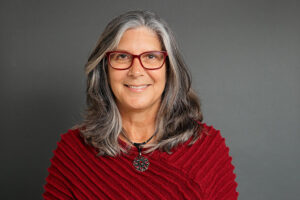
Linda Modaro, lead teacher of Sati Sangha.
The two discuss Buddhist concepts, offering a refreshingly contemporary and feministic interpretation, which is fitting for the world and conditions we live in today. Not to be confused with feminism, the political movement, the feministic values the authors weave into this orientation include receptivity, a relational approach, inclusivity, responsible use of power, accountability, collaboration, respectful feedback, and friendliness.
Much of what develops in Reflective Meditation is often a surprise, as the process of writing the book surprised even the authors. Kaufer and Modaro met weekly on Zoom, as they had done for about 15 years (previously on Skype), checking in on their lives and exploring how the dharma showed up in their life experiences.
This conversation was the basis for the book. The book poured out of them. In their writing they weren’t separating out their written thoughts, they were combining them.

Pine Street Sangha’s Portland home.
This was a new practice, writing out conversations, and they had never done it nor heard of others writing this way. Kaufer would write a few lines then Modaro, and vice versa. Sometimes they’d be writing away madly at the same time, writing over each other, interrupting each other’s written thoughts with enthusiasm.
The book continued to flow. They did free-form writing to questions they had, and integrated it with their voices and the voices of their students. Then they hit some challenging parts and had to clarify what they were trying to say. The dharma teachings are precious. They wanted to get it “right,” as understood in the eightfold path.
We leave you with an excerpt from the introduction, and an invitation to read “Reflective Meditation: cultivating kindness and curiosity in the Buddha’s company.”
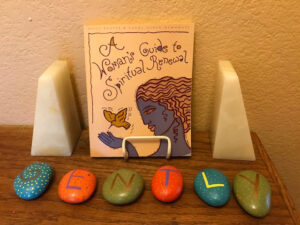
Kaufer’s earlier book, “A women’s Guide to Spiritual Renewal.”
“Reflective meditation, a friendly way to access the Buddhist teachings (dharma), is the main character of this book but you probably never heard of Reflective Meditation because we coined that name. It evolved out of recollective awareness meditation, which evolved out of Insight (Vipassana meditation) which evolved out of Theravada Buddhism, which evolved out of early Buddhism.
“Some would say Reflective Meditation evolved directly from the words of the Buddha. But the conditions at the time of the Buddha were so different. How could we know? So it goes, on and on. Just like the following descriptions of ourselves–the description of Reflective Meditation shifts and changes and can’t tell the whole story.
“First of all you should know there are a few more characters in this book: Nelly Kaufer and Linda Modaro and various meditators from Pine Street Sangha, in Portland, and Sati Sangha, online around the world, our respective spiritual communities. By the way, we aren’t quite sure who you are, though we made a list of possibilities: Buddhist practitioners, spiritual seekers, meditators, psychologically-minded people, environmentalists, artists, feminists, people looking for self-reliance, etc. Maybe you’re not on this list, so please add yourself.
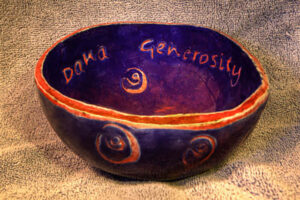
A dana bowl created by a Spokane meditator.
“Actually, come to think of it, the main character of this book is you – your experience and the evolving story of how you relate to these experiences. If our writing overshadows your experience for very long, please put this book down, turn inward, and return to yourself.
“In this book, we are choosing not to cite or name others – authors, teachers, friends, meditators. We don’t want to forget some and remember others or assign incorrect attributions. To be honest, it is challenging for us to tease their words apart in our shared consciousness. So, we keep to this principle throughout.
“However, we do want to acknowledge the many teachers and other people who have informed our hearts, minds and practice. Their efforts and dedication have blended with and been integrated into our voices.”
Kaufer and Modaro currently offer a daily online hour-long practice from 9 a.m. to 10 a.m. Pacific, and occasional online retreats. Pine Street Sangha offers monthly continuing education workshops for mental health professionals. Because Reflective Meditation is a creative approach, we regularly scheme up new offerings.
Nelly Kaufer is the founder and lead teacher at Pine Street Sangha in Portland, and has been teaching insight meditation for over 40 years. She teaches small local groups and online to a larger national community. She is a psychotherapist in private practice, integrating Buddhist psychology into her clinical orientation and teaches continuing education workshops for mental health professionals.
She co-authored, along with Carol Newhouse, “A Woman’s Guide to Spiritual Renewal,” (Harper,1994), a practical resource for women that shows how to learn from the past and grow toward a healthy spiritual life.
Linda Modaro is the founder and lead teacher at Sati Sangha, a vibrant online meditation community that offers daily virtual meditation sittings, online retreats and in-person retreats throughout the year. Previously, she had a thriving acupuncture practice in Santa Monica, California, and was a master teacher of Qi Gong. After receiving two grants from the Hemera Foundation to design a curriculum for Healthy Buddhist Communities, an online course Ethical Reflecting was born.
